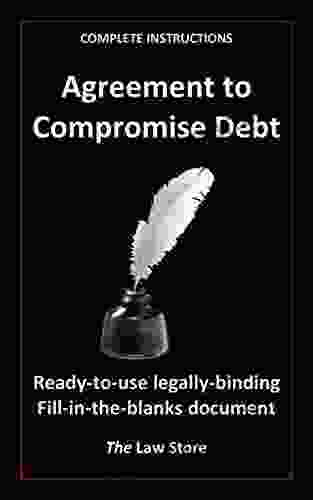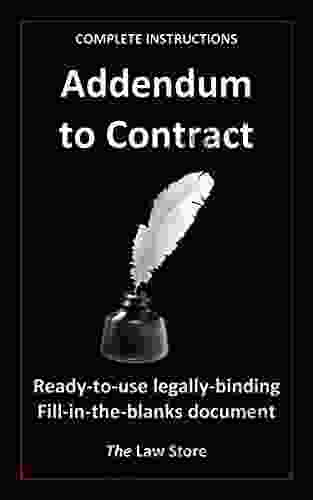: The Burden of Debt
Debt can be a heavy burden that weighs on your mind and finances. It can hinder your ability to save for the future, make major Free Downloads, or even meet your basic needs. If you're struggling with debt, you're not alone. Millions of Americans are in the same situation.
There are many different ways to get out of debt, and one option is to negotiate an agreement to compromise debt. This is an arrangement with your creditors where you settle your debts for less than the full amount owed.
4.3 out of 5
| Language | : | English |
| File size | : | 326 KB |
| Text-to-Speech | : | Enabled |
| Screen Reader | : | Supported |
| Enhanced typesetting | : | Enabled |
| Word Wise | : | Enabled |
| Print length | : | 9 pages |
What is an Agreement to Compromise Debt?
An agreement to compromise debt is a legal contract between you and your creditors that modifies the terms of your original debt obligations. Under this agreement, you may agree to pay a lump sum or a series of payments that are less than the total amount you owe.
In exchange, your creditors agree to forgive the remaining balance of your debt. This can be a significant savings, and it can help you get out of debt faster.
Benefits of Compromising Debt
There are several benefits to compromising debt, including:
- Reduced debt burden: You will pay less than the full amount you owe, which can free up more of your income for other expenses.
- Improved credit score: Settling your debts can improve your credit score, making it easier to qualify for future loans and credit cards.
- Peace of mind: Knowing that you have a plan to get out of debt can give you peace of mind and reduce stress.
How to Negotiate an Agreement to Compromise Debt
Negotiating an agreement to compromise debt can be a complex process, but it is possible to do it yourself. Here are a few tips:
- Gather your financial information: You will need to provide your creditors with information about your income, expenses, and assets. This will help them assess your ability to repay your debts.
- Contact your creditors: Once you have gathered your financial information, contact your creditors and explain your situation. Be honest about your financial difficulties and let them know that you would like to negotiate an agreement to compromise debt.
- Be prepared to make a reasonable offer: When you contact your creditors, be prepared to make a reasonable offer to settle your debts. This offer should be based on your ability to repay your debts.
- Be patient: Negotiating an agreement to compromise debt can take time. Be patient and persistent, and don't give up if you don't reach an agreement right away.
Legal Considerations
It is important to understand the legal implications of an agreement to compromise debt. Here are a few things to keep in mind:
- An agreement to compromise debt is a legal contract: Once you sign an agreement to compromise debt, you are legally obligated to fulfill the terms of the agreement.
- You may have to pay taxes on the forgiven debt: The IRS may consider the forgiven portion of your debt as taxable income. You should consult with a tax advisor to determine the tax consequences of an agreement to compromise debt.
- An agreement to compromise debt can affect your credit score: Settling your debts for less than the full amount owed can have a negative impact on your credit score. However, the impact will be less severe than if you default on your debts.
If you are struggling with debt, an agreement to compromise debt may be a viable option for you. This legal arrangement can help you reduce your debt burden, improve your credit score, and give you peace of mind. However, it is important to understand the legal implications of an agreement to compromise debt before you sign anything.
Learn more about Agreement to Compromise Debt from The Law Store


























































































